social bookmarking tools:
 |
|
| Available RSS Feeds |
|---|
 - Top Picks - Top Picks |
 - Today's Music - Today's Music |
 - Editor's Blog - Editor's Blog
|
 - Articles - Articles
|
Add Louisville Music News' RSS Feed to Your Yahoo!
|
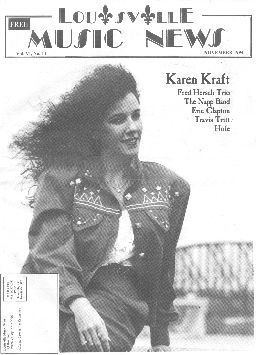
Karen Kraft goes to the Country
By Jeff Walter
For the record, Karen Kraft is a country artist.
Off the record, on the other hand, she's . . . well, she's still country. Make a note of it. File it away for future reference. Country. Never mind that you've always categorized Kraft and her band, Kiks, as a "variety" act. Forget that you've often danced with your sweetheart at Jim Porter's Good Time Emporium, swaying to the band's covers of INXS and Prince. Ignore even the indisputable fact that Kraft's new seven-song cassette, I'm Takin' It Back, concludes with a synthesizer-laced cover of that Weejun-scooting anthem "The Electric Slide."
"We even made 'The Slide' country with the fiddles and steel and everything in it," Kraft says. And so the truth is out. Lifelong Louisvillian Karen Kraft is indeed C-O-U-N-T-R-Y. Doubters are advised to visit their favorite Louisville record store and pick up a copy of the aforementioned cassette, which, despite its disco-friendly finale, drips with country passion.
Kraft is talking about her new album and her career during an interview with her husband and band mate, Ron Cook, in their Jeffersontown home. The cozy den is dominated by a mammoth entertainment center, including a reel-to-reel machine, and Cook's impressive collection of Beatles memorabilia. Cook, who's also a Louisville native, has just put the couple's 8-year-old daughter, Kirstie, to bed. Kraft is preparing to leave in the morning for Nashville, where she and Charlie Walls, who produced I'm Takin' It Back for his Springfield-based Music Man Records, plan to pitch it to the major labels and try to squeeze in a couple of live performances.
Live shows are second nature for Kraft, who has been performing regularly since she was about 7 years old. Over the years, Kraft has become a familiar sight and sound to Louisville club-goers. She and Kiks – which consists of Cook on bass, Mark Byer on keyboards, Mark Ingram on guitar, Thumper Bartlett on drums and everyone on backup vocals – were the house band for eight years at the now-defunct Flaherty's, for example, and have played regularly at clubs including Porter's, T.K.'s Pub and the Village Pub. Which brings us back to the country issue.
"Most people who see me at Porter's would say the album is so different from what they see me do live," Kraft allows. "I mean, you do what you have to do to make a paycheck. At Porter's you'd see me do 'Respect' and Whitney Houston or Mariah Carey. We do a wide variety. But we can also do an entire four-hour night of straight country. Now, what's on that tape is what I love. A lot of people don't know that. Country's what I really love."
Mixing it up
The disparity between Kraft's chosen career direction and what she does to pay the bills has resulted in the occasional problem. Sometimes the band isn't sure what's expected until it shows up for the gig. Once a pair of fans traveled to Mount Washington to catch the band, expecting to hear some rock 'n' roll. Unfortunately for them, this was to be an all-country evening. Five songs into the set, the couple waved farewell and hit the door, Kraft recalls with a laugh. "They'll be back when we're at Porter's," she says. "I felt bad because they'd driven all the way out there, but I didn't realize until we got there that it was a mainly country room. So when I put the date on our hot line, I didn't say what kind of music it was."
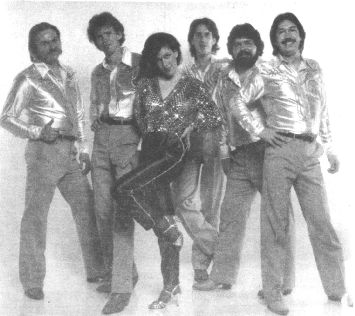
It's rare, though, that someone walks out on Karen Kraft and Kiks, whatever the evening's featured music might be. Whether the gig is at a local club or it's a special one-night engagement for a corporate event, the band is talented enough to tailor its sets to diverse audiences.
"They bring us in at T.K.'s Pub, which is normally a hard-rock room, and we go from Melissa Etheridge to Faith Hill to Patsy Cline to Prince to INXS to 'Tennessee Waltz,' " Kraft says with a laugh. "It's a wide variety in that room because you've got all ages. . . . Most of them, it's the same crowd that listens to Velcro Pygmies and R.U.O.K.? You'd be surprised at the young kids who listen to WAMZ but yet, when they go out on Friday and Saturday nights, they're headbanging to hard rock. They really like both. And, really, country anymore is so rock influenced. . . . Usually we mix it up enough that we can please everyone."
In the studio, however, Kraft is interested in mixing it up only within the boundaries of country, moving from up-tempo numbers like the album's title track to traditionally styled ballads like "Shoebox Souvenirs." Altogether, she says, the album presents a balanced picture of what Karen Kraft is all about. "More than anything I've ever done in my life, that really covers it," she says. "It's got traditional country; it's got 'The Slide'; it's got 'Takin' It Back,' which is a real kickin', Faith Hill type of song. 'We Go Together' is almost folky country. There's all styles on there, and I like all country music."
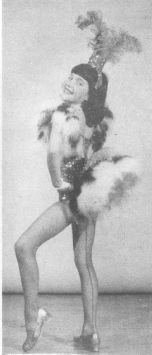
Asked to name her influences and favorite singers, she ranges from Linda Ronstadt's vintage Southern California country recordings to such modern hit-makers as Wynonna, Martina McBride, Trisha Yearwood and Hill. "I just don't have any desire to do rock, as far as recording goes," she says.
Takin' to it
Louisville has taken fairly readily to I'm Takin' It Back. "Takin' It Back," the first song and the "single," so to speak, has received daily play on WHKW The Hawk 107.7 and on one recent day was the top request on the station's "All-Request Lunch." One disc jockey even called Kraft to accuse her of phoning in herself to request the song, a charge she denied. Moments later, in her car, she was stunned to hear her part of the conversation broadcast over the radio as an introduction to the song. She was vindicated when an older woman (not her mother) called to set the DJ straight.
The anonymous Kraft fan, whose call also was carried over the airwaves, made it clear that Karen Kraft DID NOT need to request her own song because plenty of other Louisvillians were more than happy to do it for her. The woman concluded by comparing Kraft's voice favorably to Reba McEntire's. (Nevertheless, that didn't stop the jock from replying, "Thanks for the call, Mrs. Kraft.")
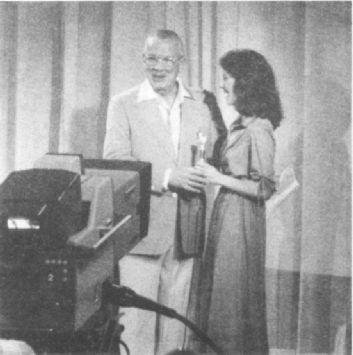
However many copies of I'm Takin' It Back eventually sell, the project has already far surpassed Kraft's expectations. "It was really just a demo, something to pitch to the labels, and it's just snowballed," she says.
That the album is convincing in its presentation of Kraft as a country singer is a testament to several elements: notably Kraft's voice, the musicians, and Walls' clean production. The instrumentation is "kind of a combination of everything," Cook says. "I played bass on a lot of the tunes. Charlie played guitar on some things, and another guy came in and played some guitar. We had a steel player and a fiddle player. A lot of it is MIDI, electronic, drum machines and keyboard modules doing the different parts. It really sounds good for that kind of recording, from an eight-track studio."
The limited liner notes don't even list the band members or other musicians, with the exception of Mike Cleveland, who was brought in to add fiddle. Both Kraft and Cook remain awed by the work of Cleveland, a blind 12-year-old. "He's just tremendous," Kraft says. The steel player was Beck Collins, who used to play with Steve Wariner and served as his road manager for 12 years.
In the clubs, the country songs from the album have been just as well received as they have been on the radio. "It's wonderful. I mean I get more applause when I do 'Takin' It Back' than I do for about anything else. There's a song that we have not recorded yet, an original that we got from Nashville, that gets more response than 'Piece of My Heart,' " Kraft says, referring to the band's cover of the Faith Hill version of the Janis Joplin standard. "It's a killer song. We haven't recorded it yet, but it's coming."
Learning to write
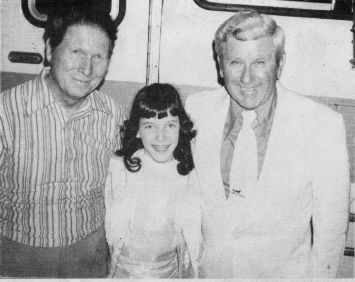 Karen Kraft, age ten, with Redd Stewart, left, and Pee Wee King, at a traveling Grand Old Opry show in Bowling Gree, KY. Photo by Vaughn Craft
Karen Kraft, age ten, with Redd Stewart, left, and Pee Wee King, at a traveling Grand Old Opry show in Bowling Gree, KY. Photo by Vaughn Craft

The band has been concentrating most of its efforts lately on working up the songs from the album. Therefore it has lagged a bit in adding current hits to its repertoire. There are several that Kraft wants to add soon, including Mary-Chapin Carpenter's "Shut Up And Kiss Me," Faith Hill's "Take Me as I Am" and Vince Gill's latest ballad.
With the exception of "Country Slide," the countryfied dance number, the songs from the album are all new to the marketplace. The husband-and-wife team of Kraft and Cook co-wrote two songs: "One Step Closer" with Walls and "We Go Together" with George Cochran. All of the songs but "Takin' It Back," which came from a Nashville publisher, and "Country Slide" are published by Walls & Reid Music.
Kraft credits Walls with pushing her and Cook to write their own material. "I've always wanted to write, and I've tried. Ron is really better at it than I am. I come up with little ideas, and then he goes on with them. Charlie really got us involved in writing, more than anybody. He said, 'You really need to write.'
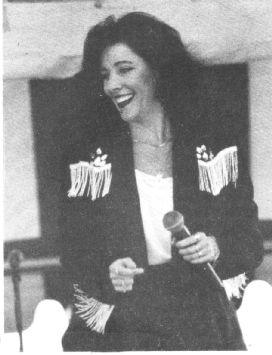
"We'd go down there (to Springfield), and I would just put my voice on his songs for demos for him. And then it got to the point where I thought, well, this is good because I can go down there and get the experience of recording. It doesn't matter how long. I can play around with stuff, do whatever I want to do vocally, and it's not costing me anything. Nobody's got me on a clock and I don't have to worry about money; I can just be creative.
"And then it got to the point where I'd say, 'That doesn't really sing quite right. It'd be better if we did it this way.' Then I started changing lines, and Charlie said, 'You know, that's a great idea. Try writing something.' So we sat down and started writing, and I really enjoyed it. We tried to do it here at home, and it's just impossible. The phone ringing, Kirstie . . . it's impossible. But when we go down there, it's just me and Ron and Charlie and a guitar, and we just sit around and write."
A hard-learned lesson
Kraft and Cook's association with Walls goes back a few years, but it took time for the relationship to grow. The Louisville couple have a hard time remembering exactly how it started, but they remember being skeptical when he first approached them. They had just been burned by a Nashville producer – a fairly disreputable one, they found out too late – who took their money and failed to deliver the goods as promised. So they were understandably a bit gun-shy.
Meanwhile, Walls had been pitching some songs in Nashville when he saw Kraft's picture on a cassette on the desk of another producer's secretary. He recognized her, as well as the name of the disreputable producer, and was troubled that Kraft had gotten involved with such a person.
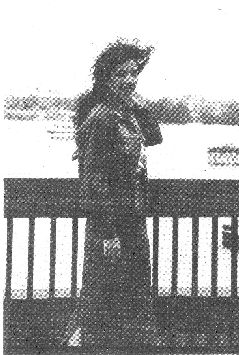
On his return to Louisville, Walls caught Kraft's act at Jim Porter's. "She didn't know me from Adam, but I told her what I thought the problem was," he says. "One thing eventually led to another. The simple fact is, if I like an artist or a group, or a song, and the people want to work with me, it doesn't cost them a dime. . . .
"But it took them a long time to decide to come down here."
Since the relationship has begun in earnest, however, it has been rewarding for all involved. Visits to about 25 small-town radio stations along Interstate 75 provided ample evidence that people will play, and enjoy, Kraft's music.
"I don't really think about return on investment," Walls says. "The financial reward has to be so secondary it doesn't even matter. To be honest, with Karen I've gotten so much return on investment simply because her music has been accepted throughout the state. When you hear your song played on the radio not because it's on the Billboard play list but because it's genuinely liked, money can't buy a feeling like that."
For Kraft, the difference between her negative Nashville experience and her work with Walls has been remarkable. "I'm here to tell anybody," she says, "that if somebody believes in you enough, they will put you in the studio and do it for you. You don't have to go down to Nashville and spend money. If they want any money, run out that door the opposite way as fast as you can. No matter how bad you want it, it doesn't cost money to be a star. It takes talent and having somebody believe in you and being ready for it. I'm a firm believer in that – the hard way!
"There are times when you may have to do a demo tape or something, but don't go spending thousands and thousands of dollars in Nashville. If anything, you lose the respect of the people whose respect you really need.
"The best thing about Charlie is that he doesn't ask for anything. You don't have to put your name on the dotted line; he doesn't want a piece of you for the rest of your life. He just wants to see you do something. And you can tell he really, honestly, sincerely believes. He really has confidence that I can do something."
And Kraft has confidence in Walls' ability to develop important Nashville contacts, to get her music in front of the right people. "He knows how bad I really want it. Yet he understands that I have a daughter, and she's important, and he understands that I can't go to Nashville every week and beat doors. And I'm not going to sell my home and everything I have and starve to death in Nashville."
Walls believes in Kraft's music, but he knows the road to success in Nashville – like the road to success anywhere else – is a long, hard one filled with obstacles. He's hardly a household name in Music City, but, through his numerous trips to pitch material there over the years, he has earned some measure of name recognition and respect from people who "matter." He jokes that "they respect me just enough to let me in and tell me that they don't like it."
Although he's careful not to make any brash claims, he thinks Karen Kraft's unique strengths put her in a position to catch the attention of a major label executive. "Whether something good will happen with Karen, I don't know," he says. "If not, it won't be because we're not trying. I don't want to go to anyone and cry wolf by saying this is the greatest new singer around or anything like that, because they're likely to play me a bunch of tapes by people who are just as talented.
"But when I saw Karen playing recently at the Chicken Festival in London and at the state fair, it really struck me that her best attribute is the way she communicates with the women. They really identify with her. . . . They all eat it up. After those shows, I made up my mind we were going down to Nashville."
No turning back
While Karen Kraft may still be a significant distance from big-time country music success, she's already come a long way. She's a seasoned performer, having entertained crowds of people ever since her early grade-school years. A picture in one of her photo albums shows her at age 7, singing before an audience of soldiers at Fort Knox. USO shows became common occurrences for her in those days.
People had first started noticing her singing ability at about age 5, when she began singing along with the record of "Ain't She Sweet" that her dance teacher, Patsy Brewer, was playing. Within a matter of years of honing her vocal skills to the accompaniment of Linda Ronstadt records, she was opening a show for Pee Wee King at Bowling Green's Diddle Arena. She sang at her first Crusade for Children in 1971, when she was 9, and has been a regular ever since. "It's a wonderful, wonderful program to raise money for physically handicapped children," she says. "It's probably the most worthwhile thing I do."
By now, Kraft is fully aware of the naysayers who think she has been around too long to be a success. She is undeterred. And why shouldn't she be? She is in her early 30s, which is still young, even though the average age on CMTV these days seems to be about 25. She has a great voice that, coupled with good songs and a winning personality, makes her a compelling entertainer. And she remains – as they might say in the biz – "video-friendly."
Another plus is a spouse who understands the music thing. After all, they're in it together. Not that it's all roses. As Cook says: "It has its good points and its bad points. There are times when, say, we're mad at each other about something and we've got to go in and work. That's a little tough sometimes. But it's good because we're together, and it gives us more flexibility in what we're able to do. During our off time, we're off together."
Kraft adds: "We've been married 12 years, but he says it's 24 years. Because we're together twice as much."
When they're not performing, the singer makes money giving private vocal lessons, and the bassist works part time at UPS. Because of various job and family commitments, the band doesn't play at out-of-town nightclubs, although it will do the occasional special event, like a recent corporate affair in Lexington. "We used to play out of town, but we cut it out because of our daughter," Cook says.
Work, play and family. Considering all that's going on at the moment, Kraft and Cook are maintaining a fairly normal life. There's a possibility that could change.
"Every day, you just never know what's going to happen," Kraft says, laughing again. "It's always something. I keep waiting to wake up in the morning and have nothing happen that day. But it just keeps going. Of course, I've been trying to keep it going. I get on the phone with my agenda for the day. 'Now today I need to call these two people and see if I can get this.' And with Charlie doing the same thing, both of us going at it, things are being accomplished.
"So, hopefully, sometime in the future, you'll look at that tape and it will say 'MCA Records' or 'Curb Records,' 'Sony' or 'Asylum.' I'm going after the big ones, if I'm gonna dream!"
